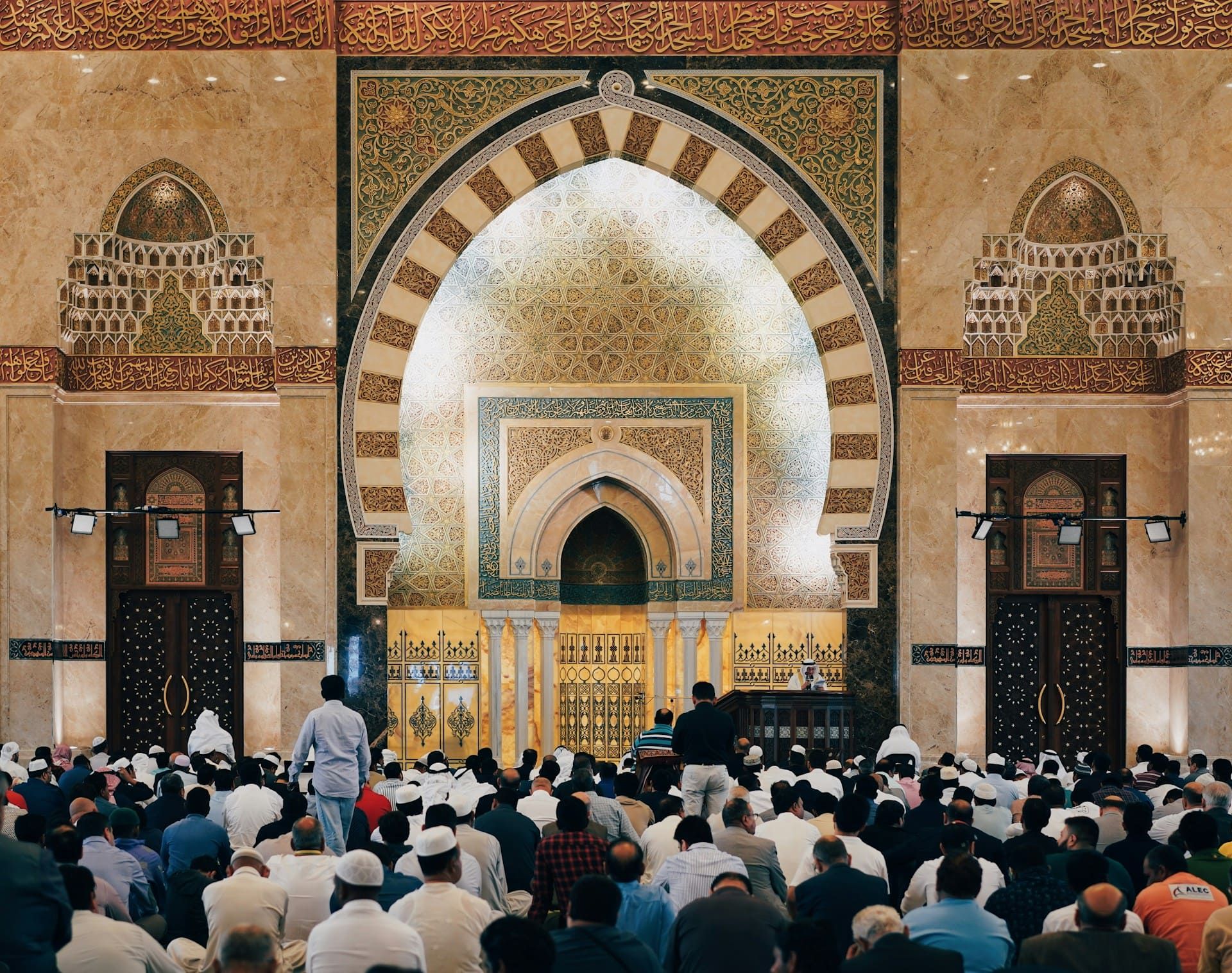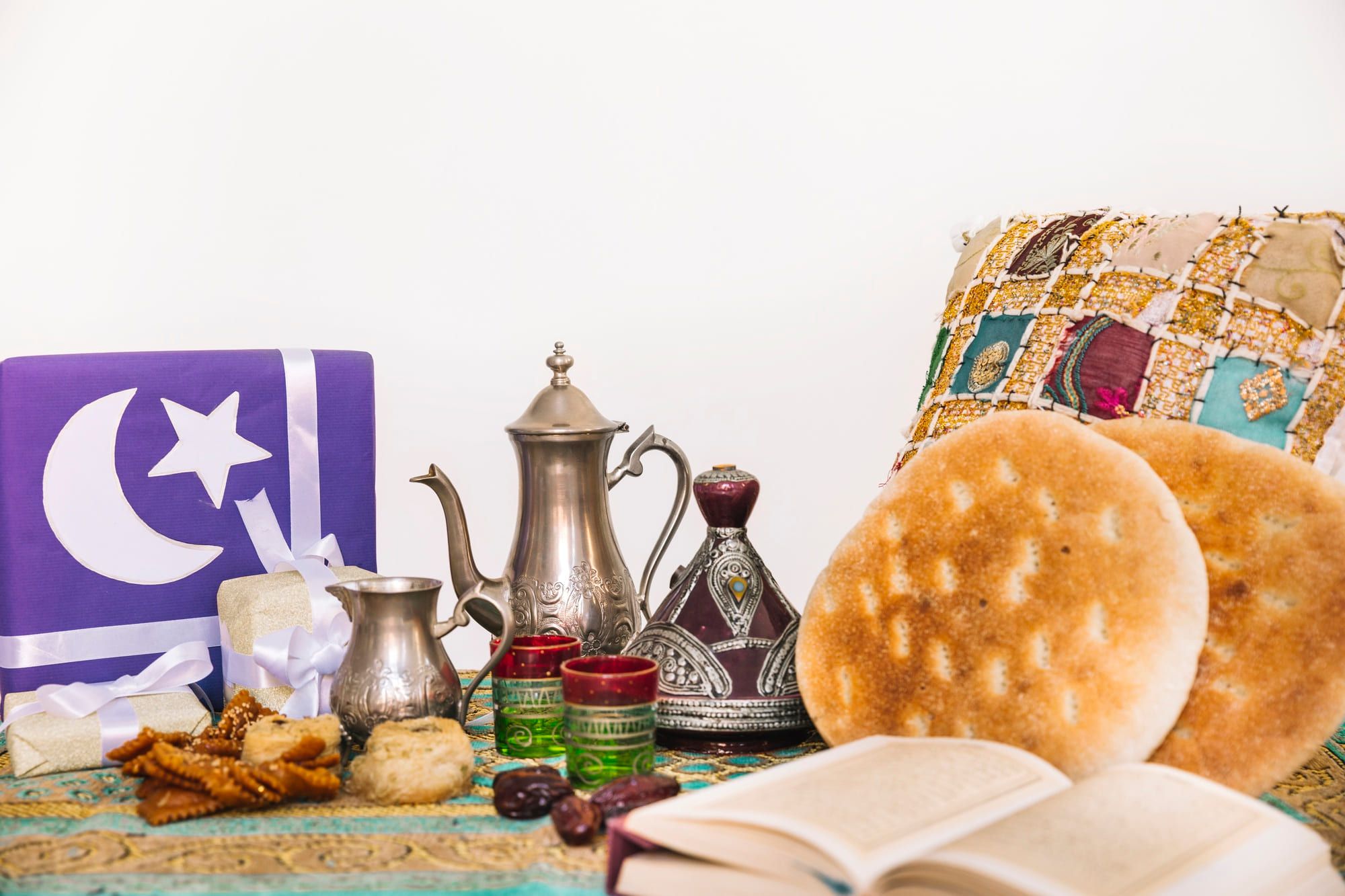Ramadan, a month of fasting, prayer, and reflection for millions worldwide, is coming up in 2025! In this guide, you’ll find everything you need to know, from why people fast and pray to the food and traditions involved. It might seem complicated, but we’ll break it down for you.

What is Ramadan?
Ramadan is the ninth and holiest month of the Islamic lunar calendar and is observed by Muslims all over the world. Ramadan is one of the Five Pillars of Islam, during which Muslims fast from dawn (Fajr) to sunset (Maghrib). This fasting means abstaining from food, drink, and other physical needs during daylight hours to focus on spiritual growth, self-discipline, and a closer relationship with Allah.
During Ramadan, Muslims strengthen their relationship with Allah using praying and recitation of the Quran and acts of worship. The fast during this holy month makes them think of the struggles of those in need, foster empathy and compassion for fellow human beings, and extend kindness and charity to others.
Religiously, Ramadan is a time for families and communities to strengthen their bonds. Iftar, the meal to break the fast, is a communal event where families and friends gather to eat. Sharing meals helps them develop connection and gratitude.
Almsgiving is another major feature of Ramadan. Muslims are also encouraged to give zakat (mandatory charity) and sadaqah (voluntary charity) to assist the poor and needy, thus encouraging values of compassion and social justice.
In a few words, Ramadan encourages love, kindness, and togetherness. Through fasting, helping others, and spending time with loved ones, people build stronger bonds and develop greater empathy and unity.

Photo by Rumman Amin on Unsplash
The Meaning and Importance of Ramadan
Ramadan, a period of abstinence during the ninth month of the Islamic calendar, holds great significance to Muslims. During this time, they fast, known as ṣawm, from dawn until sunset, which means they abstain from eating, drinking, or fulfilling other physical needs. It’s also a time for prayer and spiritual growth, helping people build self-control and understand the struggles of those in need.
This month is important because it commemorates the revelation of the Quran to Prophet Muhammad. Muslims believe that praying and reading the Quran during Ramadan helps them feel closer to God. The Night of Power (Laylat al-Qadr), on the 27th night, holds special spiritual significance.
All in all, Ramadan is a period of reflection, personal growth, and connecting with others. It strengthens important values like kindness and generosity within the Muslim community.

The Meaning Behind Ramadan’s Symbols
Ramadan has a few important symbols for Muslims:
- Crescent Moon: The crescent moon is an important symbol during Ramadan. It marks the start and end of the month because the Islamic calendar is based on the moon. When the new moon is seen, it signals the beginning of Ramadan.
- Lanterns: Lanterns, known as famous, are used to decorate homes and mosques during Ramadan. They represent light and guidance, symbolizing the spiritual clarity that comes from fasting and praying.
- Mosques: Mosques are very important during Ramadan. They are where Muslims gather for prayers, especially for Taraweeh, which are special prayers held at night. The mosque symbolizes the sense of community and unity among Muslims.
- Dates: Dates are eaten to break the fast at sunset, following the example of Prophet Muhammad, who broke his fast with dates and water. They represent nourishment and hospitality.
- Quran: The Quran is especially important to Ramadan because it is believed to have been revealed in this month. Many Muslims try to read or recite the entire Quran during Ramadan to honor its significance in their faith.

Fasting During Ramadan: Rules and Guidelines
Ramadan fasting means Muslims abstain from food, drink, smoking, and sexual relations from dawn (Fajr) until sunset (Maghrib). They start the day with a pre-dawn meal called suhoor, which provides energy for the fast. The fast is broken at sunset with a meal known as iftar, usually taken with dates and water.
There are exceptions where people do not need to fast, such as children, the elderly, pregnant or breastfeeding women, travelers, and those who are ill. If someone can’t fast because of health reasons, they can either feed someone else, make up the fast later, or donate to charity.
To stay healthy while fasting:
- Eat balanced meals during the hours you’re not fasting.
- Choose foods with protein, fiber, and water content.
- Drink plenty of water before iftar and after suhoor.
- Avoid arguing or gossiping.
Fasting is not just about food; it’s also about nurturing the soul. Reciting the Quran, praying, and giving to charity can help make the fasting experience more meaningful.

When Does Ramadan 2025 Start and End?
Ramadan in 2025 is expected to start on the evening of February 28 or the evening of March 1. The first day of fasting will be either March 1 or 2, depending on the moon sighting.
Ramadan month will last 29 or 30 days, ending on March 30 or 31. The exact dates vary based on the sighting of the crescent moon, which marks the start and end of Ramadan.
Eid al-Fitr follows Ramadan and marks the end of fasting. It is a festive day that includes prayers, meals, and donations to ensure everyone can join in the celebration.
How to Prepare for Ramadan: Tips for a Fulfilling Month
Getting ready for Ramadan includes both spiritual and practical steps. Here are some tips to help you get ready:
- Set Spiritual Goals: Think about what you want to achieve spiritually during Ramadan, like praying more, reading the Quran, or helping others. Write these goals down to stay focused.
- Practice Fasting: Try fasting on Mondays or Thursdays before Ramadan. This helps your body get used to fasting and builds your strength.
- Set a Daily Routine: Make a daily schedule that includes time for prayer, reading the Quran, and thinking about its meaning. This helps balance worship with your daily tasks.
- Eat Healthy: Start eating well by having balanced meals and drinking enough water. This will help your body get ready for fasting.
- Clear Your Space: Organize both your home and digital devices. A clean environment helps you stay calm and focused during Ramadan.
- Connect with Family: Talk about Ramadan with your family. Share your goals and support each other in your spiritual growth.
- Learn about Ramadan: Read up on what Ramadan is and its practices. Understanding its meaning can make your experience more meaningful.
Ramadan Around the World: Unique Traditions and Customs
Ramadan is celebrated in different ways around the world but they all keep the main values of community, reflection, and spirituality. Here are some of the most important ones:
- In Egypt, the Fanous, or lantern, is a well-known symbol. Egyptians decorate their homes with colorful lanterns to celebrate Ramadan. A drummer called Al Mesaharaty walks through the streets, waking people for the pre-dawn meal by calling out names.
- In Indonesia, the Padusan ritual is a tradition where people bathe in natural springs before Ramadan to cleanse both their body and spirit. Another tradition, Nyekar, sees families visiting the graves of their loved ones to pray for them.
- In Lebanon, the Midfa al Iftar is a cannon fired at sunset to mark the end of fasting during Ramadan. This tradition started in Egypt and has become a daily event in Lebanon.
- In Turkey, drummers walk through neighborhoods to wake people up for suhoor.
- In Morocco, people eat traditional dishes like Harira soup and wear special clothes during the month.

Image by KamranAydinov on Freepik
Eid al-Fitr 2025: When and How It Is Celebrated
Eid al-Fitr is a major Islamic holiday that marks the end of Ramadan and the start of Shawwal. Eid al-Fitr in 2025 will be celebrated from the evening of March 30 until the evening of March 31.
The day starts with a special prayer called Salat al-Eid, which is done together in mosques or open areas. Muslims wear new clothes, often traditional ones. After the prayer, they greet each other with “Eid Mubarak,” which means “Blessed Eid.”
Food is an important part of Eid al-Fitr. Families prepare special meals, including sweets and special dishes. It’s common to share food with neighbors and people in need as a symbol of kindness and generosity.
Giving Zakat al-Fitr, a form of charity, is an important tradition. It helps make sure everyone, including those who are less fortunate, can join in the celebrations.
Eid al-Fitr is a time to be with family, give gifts, and enjoy community events. While the way it’s celebrated can differ between cultures, the main idea is to be thankful for finishing Ramadan and to celebrate being together.

Photo by Chattrapal (Shitij) Singh
Stay Connected During Ramadan with Yoho Mobile
Planning to celebrate Ramadan? How will you keep track of local events or stay in touch with family?
With mobile data, you’re always connected and informed. Yoho Mobile eSIM offers you reliable internet access no matter where the celebrations take you. It’s the easiest and fastest solution—perfect for travelers who want to stay online while enjoying the festivities.
Give roaming charges and old SIM cards a rain check with a Yoho Mobile eSIM!
🎁 Exclusive Offer for Our Readers!🎁Enjoy a 12% discount on your orders with Yoho Mobile. Use the code 🏷 YOHOREADERSAVE 🏷 at checkout. Stay connected and save more on your trips with our eSIM. Don’t miss out—start saving today! |
Frequently Asked Questions About Ramadan
What is Ramadan Mubarak?
“Ramadan Mubarak” is a common greeting among Muslims during Ramadan, the ninth month of the Islamic calendar. The phrase combines “Ramadan,” the ninth month of the Islamic calendar, and “Mubarak,” which means “blessed.” This greeting is used to wish others well as they fast, pray, and focus on charity during this special time.

Can you drink water during Ramadan?
During Ramadan, Muslims don’t drink water from dawn until sunset because drinking breaks the fast. They can only drink before sunrise and after sunset. However, people who are sick, traveling, pregnant, or breastfeeding can drink during the day, but they have to make up for the missed fasts later.
Can you smoke during Ramadan?
Smoking is also not allowed during fasting hours because it breaks the fast. It’s important to stay hydrated during the hours when fasting isn’t required by drinking water and eating foods that help with hydration.
What can you not do during Ramadan?
During Ramadan, Muslims must avoid certain things from dawn until sunset, including:
- Eating and drinking: No food or drinks are allowed during fasting hours.
- Smoking: Smoking is not allowed while fasting.
- Sexual activity: Having sex breaks the fast.
- Negative behavior: Things like lying, gossiping, arguing, and swearing should be avoided.
- Deliberate vomiting: Making yourself vomit breaks the fast.
These rules are meant to help focus on spiritual growth and self-discipline during this time.
Can you listen to music during Ramadan?
Listening to music during Ramadan is a topic that many Muslims disagree on. Some scholars say music is forbidden at all times, while others believe it is especially discouraged during Ramadan because it can distract from prayer and spiritual focus.
Some people think it’s fine to listen to music quietly or privately, while others feel any music can interfere with worship during this holy month. Different cultures and communities within Islam have different views on this.
What does Ramadan Kareem mean?
“Ramadan Kareem” is a greeting often used during Ramadan. It means “Generous Ramadan” and expresses good wishes for a blessed and fulfilling month. People say it to hope for spiritual growth, connection with others, and acts of kindness during the time of fasting and reflection. It reflects the focus on sharing and generosity that is important in Ramadan.
